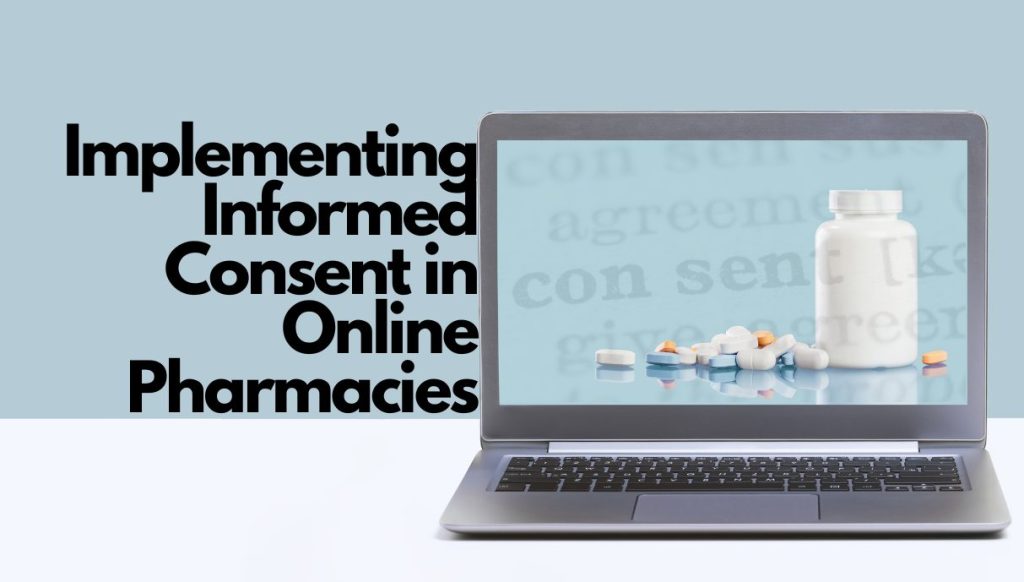The Role of Informed Consent in Online Pharmacies
Informed consent, a foundational principle in healthcare, ensures individuals are fully informed about their treatment options. With the emergence of online pharmacies, this principle faces new challenges. As more consumers turn to the internet for their medication needs, ensuring they fully understand the implications and details of their choices becomes crucial. This situation underscores the importance of adapting informed consent to the digital age, ensuring clarity and understanding in an ever-evolving healthcare landscape.

The Importance of Informed Consent
In the world of online pharmacies, informed consent means ensuring that people have all the necessary information about medications they consider buying through the internet. This concept is not only about providing details but also about making sure that the information is clear, accurate, and easily understood. Informed consent carries both legal and ethical weight, requiring online pharmacies to present information responsibly and consumers to understand the implications of their choices.
Legally, informed consent helps protect consumers by setting standards for the information that must be shared. Ethically, it upholds the principle of respect for individuals’ autonomy and decision-making abilities. Without clear informed consent, consumers may face significant risks, such as misunderstanding how to use medications properly, which can lead to misuse or even harm.
How Online Pharmacies Implement Informed Consent

To ensure compliance with FDA guidelines and enhance informed consent, online pharmacies are employing a comprehensive array of strategies aimed at making medication information more accessible and understandable. Here’s an overview of the measures being taken:
- Simplified Language: Complex medical terms and information are broken down into easier-to-understand language. This approach allows individuals without medical backgrounds to comprehend essential details about medications.
- Visual Aids: Charts, diagrams, and infographics are used to visually present information related to dosages, side effects, and the mechanism of action of medications. Visual aids facilitate better understanding, especially of complex concepts.
- Interactive Tools: Platforms may offer quizzes or checklists that guide consumers through the key information about medications, engaging them actively in the process of informed consent.
- FAQ Sections: Frequently Asked Questions sections address common queries about medications, providing straightforward answers that help demystify medical information for the average consumer.
- Customer Support Services: Dedicated support services, including live chat and helplines, allow consumers to ask specific questions and receive immediate, personalized responses, aiding in informed decision-making.
- Video Explanations: Videos can offer an engaging way to explain the details of medications, presenting complex information in an accessible format.
- Digitization of Patient Information Leaflets (PILs): By making patient information leaflets available digitally alongside medication listings on websites, consumers can easily access comprehensive information about medication use, side effects, and contraindications.
- Transparency about Source and Quality: Online pharmacies are increasingly transparent about the source and quality of their medications, including information on manufacturers and quality assurance measures, to ensure consumers are well-informed.
- Secure Platforms for Personal Data: Acknowledging that informed consent involves secure handling of personal health information, online pharmacies are enhancing their platforms’ security to protect sensitive data.
These measures reflect online pharmacies’ commitment to adhering to regulatory guidelines and enhancing the quality of informed consent. By making healthcare information accessible, understandable, and secure, these platforms are empowering consumers to make informed decisions regarding their healthcare.
Benefits of Improved Informed Consent
Enhanced informed consent within online pharmacies introduces significant benefits, vital for both consumers and the pharmacies themselves:
- Increased Safety for Consumers: By providing clear and comprehensive information about medications, consumers are better equipped to make safe choices, reducing the risk of misuse and adverse effects. This ensures a safer approach to medication use, as individuals understand both the benefits and potential risks involved.
- Better Understanding of Medication Use: Simplified medical language and the use of visual aids help consumers grasp complex information about their medications. This leads to a deeper understanding of how to use medications correctly, enhancing treatment efficacy and adherence.
- Empowerment in Making Health Decisions: Detailed and accessible medication information empowers consumers to take charge of their health decisions. This empowerment fosters confidence and a sense of responsibility, encouraging proactive health management.
- Improved Customer Trust for Online Pharmacies: Transparency in medication information builds trust between consumers and online pharmacies. This trust is crucial for establishing long-term relationships, ensuring customer satisfaction and loyalty.
- Legal Compliance for Online Pharmacies: Adhering to informed consent regulations helps online pharmacies meet legal standards, protecting them from potential legal issues. Compliance reinforces the pharmacy’s commitment to consumer safety and ethical practices, enhancing its reputation and reliability.
Through these measures, improved informed consent significantly contributes to a safer, more informed, and trustworthy digital healthcare environment.
Challenges and Considerations
Ensuring effective informed consent in the online pharmacy sector faces notable challenges. One of the main hurdles is overcoming technological barriers that can impact the accessibility and understanding of medication information. Creating secure, user-friendly platforms that cater to a diverse audience is crucial yet challenging. These platforms must present information in a way that is easy to navigate and understand, regardless of the user’s health literacy or tech-savviness. Additionally, the varied needs of consumers, who come from different backgrounds and have different levels of understanding about health, present a challenge in providing one-size-fits-all information. Tailoring this information to meet individual needs without overwhelming or underinforming is a delicate balance to strike.
Critics of current informed consent practices in online pharmacies often highlight the need for improvements in the way information is delivered. There is a consensus that more effort is needed to ensure the information provided is not only comprehensive but also clear and engaging. This includes addressing the potential for information overload, where consumers are presented with so much information that it becomes difficult to discern what is most important. Moreover, there is a push for more personalized approaches to informed consent, suggesting that adapting information to suit individual consumer profiles could lead to better understanding and safer medication use. These critiques underscore the importance of continual evaluation and innovation in informed consent practices, aiming to bolster consumer safety and confidence in the increasingly digital landscape of healthcare.
Conclusion
Enhancing informed consent in online pharmacies is crucial for safe and informed health decisions. Both consumers and pharmacies play a role in prioritizing this, with consumers seeking out information and pharmacies providing clear, accessible details. This collective effort can lead to a safer, more transparent online healthcare environment, emphasizing the importance of informed decisions in every transaction.
